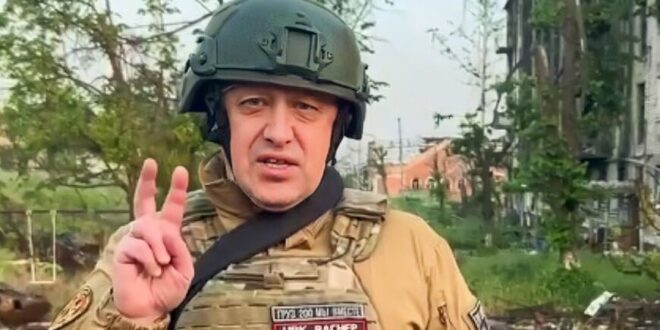Russia’s grey-zone influence in the Middle East and Africa enters uncharted territory amid reports of the Wagner chief’s death.
Russian state media claimed that Yevgeny Prigozhin, the de facto head of the Wagner paramilitary organization, was killed along with nine other people onboard a private jet that tumbled out of the skies north of Moscow on Wednesday.
A flight roster released by Russia’s Federal Air Transport Agency, known as Rosaviatsiya, also listed Dmitry Utkin on the downed plane. Utkin, a little-known former GRU officer, is thought to be the founder and early military leader of the Wagner group.
Telegram channels linked to the Wagner group alleged the plane was brought down by Russian anti-aircraft fire near Tver on Wednesday night.
A Telegram channel linked to Wagner, called Grey Zone, posted Wednesday night: “The head of the Wagner Group … Yevgeny Viktorovich Prigozhin died as a result of the actions of traitors to Russia.”
“The murder of Prigozhin will have catastrophic consequences. The people who gave the order do not understand the mood in the army and morale at all,” the social media channel warned.
The aircraft was identified as an Embraer Legacy 600, reportedly owned by Prigozhin.
A longtime lieutenant of Russian President Vladimir Putin, Prigozhin led an aborted insurrection against his government in June in response to what he described as the Kremlin’s disastrous war effort in Ukraine, which has cost Russia’s forces nearly 300,000 casualties, according to recent US intelligence estimates recently by The New York Times.
Following the attempted coup, Prigozhin went into exile in Belarus under a deal negotiated by Belarusian President Alexander Lukashenko before he reportedly returned to St. Petersburg. Earlier this week, a video surfaced online showing Prigozhin donning camouflage and combat gear, apparently in Africa, calling for new recruits.
The Wagner leader was believed to oversee a broad network of mercenaries and business interests across the Middle East and Africa, with assets in Syria, Libya, Mali, the Central African Republic and Sudan, propping up local forces often in exchange for exclusive deals to extract natural resources, including gold and oil.
Prigozhin’s forces first emerged from the shadows as deniable units assisting Russia’s 2014 invasion of Crimea before deploying to Syria, where the group fought against rebel and jihadist forces in support of the battered forces of Syrian President Bashar al-Assad.
Wagner has seen mixed returns on its investments in countries such as Libya and Sudan, but Prigozhin’s precipitous rise to power over the past decade was reflected in the strategic footholds abroad which his group helped deliver for the Kremlin.
Wagner’s foray alongside the Russian military into Syria in 2015 followed the CIA’s own program supporting the rebels, as well as direct appeals to Moscow by the late Iranian commander Qasem Soleimani, head of the notorious Quds Force of the Islamic Revolutionary Guard Corps.
Yet while Russia’s intervention on behalf of Damascus helped ensure the Kremlin held onto its only Mediterranean naval base at Tartus, Prigozhin’s gambit failed to pay off as anticipated.
A relentless drive by US Special Forces and Syrian Kurdish-led fighters pushed the Islamic State fighters out of eastern Syria’s oil-rich Deir Ezzor region before Russia’s forces could cross the Euphrates River to claim the prize.
In February 2018, a botched attempt by Wagner and reportedly hundreds of other pro-Syrian regime fighters to seize gas fields held by US forces and the Kurdish fighters in Deir Ezzor led the Pentagon to authorize a blistering response that reportedly left as many as 300 Wagner fighters dead. Russian forces have not launched any major attempt to push the US out of Syria since, though non-lethal forms of harassment have continued.
In 2019, Wagner mercenaries flooded into eastern Libya to support rogue warlord Khalifa Hifter’s surprise offensive against the United Nations-recognized government in Tripoli.
Despite receiving financial support from the UAE, according to US defense intelligence, Wagner failed to lead Hifter’s militias into the capital and secure access to the country’s lucrative oilfields after Turkey rushed its own forces and Syrian mercenaries to support Tripoli in response.
The Pentagon’s top commander of forces in Africa at the time sounded the alarm over the Kremlin’s new foothold on NATO’s southern flank, which included fighter jets and mobile air defense systems.
The group has been widely accused of war crimes across roughly half a dozen countries, including Syria and Ukraine. In Africa in particular, Wagner’s forces have been accused of crimes against humanity.
Earlier this year, a UN report detailed the mercenaries’ responsibility for a massacre of some 500 people, the majority of them unarmed civilians, in central Mali. Rights groups have also documented massacres by Wagner fighters in the Central African Republic, where the mercenary group is accused of training local security forces in brutal torture techniques.
It remains to be seen what may become of Prigozhin’s mercenaries and patronage networks in his absence, though analysts told Al-Monitor that his legacy, however brutal, remains too valuable for the Kremlin to simply abandon.
 Eurasia Press & News
Eurasia Press & News



